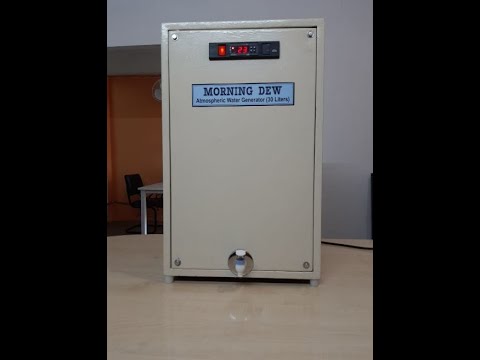Key Factors to Consider When Purchase Water Generator
1. Water Production Capacity
- Explanation of different capacities (liters per day, LPD)
- Ideal capacity based on household vs. commercial use
2. Energy Efficiency
- Understanding energy consumption (kWh)
- Comparison of energy usage vs. water output
- Features that enhance energy efficiency (e.g., solar compatibility, low-energy modes)
3. Water Quality and Filtration Systems
- Types of filtration systems (pre-filters, carbon filters, UV filtration, etc.)
- Importance of water purity and health considerations
4. Maintenance and Ease of Use
- Cleaning and maintenance requirements
- User-friendly features like automatic filters and alerts
5. Size and Portability
- Size options for residential vs. commercial use
- Portability and ease of installation
- Storage considerations (tank size, space requirements)
6. Cost and Budget Considerations
- Initial purchase cost vs long-term operational costs
- ROI (return on investment) from savings on bottled water or municipal water bills
7. Durability and Warranty
- How long do water generators typically last?
- Importance of warranty and customer support
8. Environmental Impact
- Eco-friendly aspects of water generation
- Water conservation benefits
- Materials used in manufacturing
As more people become concerned with water shortages and the safety of traditional water sources, more households and businesses are turning to new technologies like water generators (more specifically called atmospheric water generators or AWGs). Water generators pull water from air and provide a sustainable and dependable source of clean drinking water.
At Clean Water Problem, we help people address one of life’s greatest challenges – easy access to clean water. If you are thinking about purchasing water from air machine, it is important to understand the technology involved, the costs associated with the purchase, and which features play a role in meeting your needs.
This is your ultimate guide to selecting the right atmospheric water generator for home or commercial use.
What is a Water Generator?
The water generator (also referred to as an atmospheric water generator / AWG) is a device that extracts moisture from the air and – through condensation, filtration, and mineralization – transforms it into potable water. AWG water provides a clean alternative to household or commercial settings, regardless of water scarcity or unwanted alternative sources.
1. Daily Water Production
One of the initial considerations is your daily water requirement. AWG machines come in a range of capacities—from small units that generate 15–20 liters a day to large commercial systems generating hundreds of liters.
- Ask yourself:Will it be for home, office, or industrial use?
- How many people will use the water on a daily basis?
- When you specify the daily water requirements, it helps to establish the right capacity to be efficient and cost-effective.
2. Water from Air Machine Price
The water from air machine prices can vary vastly according to capacity and technology, as well as brand.
For residential models the average cost for residential models, but high capacity air to water generators for commercial use will rise.
While considering the water from air machine price in India, be sure to check not just the initial cost, but also the ongoing operation and services, including:
- Electricity usage
- Filter replacement
- Maintenance costs
At Clean Water Problem, we believe in honest pricing and will help you find the best value for money models on the market.
3. Local Climate and Humidity
Atmospheric water machines are most effective in scenarios with a relative humidity greater than or equal to 30%. Areas with warmer, wetter climates (like the tropics or coastal regions) tend to produce more. Before investing in a water generator machine, it’s critical to check what local humidity is like. Some atmospheric water generator models are made to operate best in low humidity, but there’s a wide variability in performance.
4. Energy Use
Because AWGs (atmospheric water generators) require condensation and refrigeration, they do draw some electricity. Look for energy-efficient units with these options:
Low wattage – hours of electricity per 1 literSmart sensors and auto shut off
Compatible with renewable energy sources (solar, etc)Using an energy-efficient AWG water generator leads to a lower ecological footprint for you as well as better electricity bills.
5. Filtration and Mineralization
Not all AWGs are built the same way inside. High-quality machines are equipped with multi-stage filtration systems to rid the water of bacteria, dust, and other airborne contaminants. Some machines boast the ability to re-add essential minerals to the water for better taste and health benefits.
Key components to look for are:
- HEPA or Carbon air filters
- UV purification or RO systems
- Mineral cartridges or alkalization options
At Clean Water Problem, we support AWGs that balance taste, safety and purity, for the long haul.
6. Storage and Dispensing Options
When weighing temperature and consumption needs, storage capacity can be significant. Most models come with built-in tanks that generally range from 5 to 100 liters or more. Larger tanks may offer additional features, such as:
- Hot/cold water dispensing
- Touchless or sensor-activated taps
- Backup battery or solar support
When considering storage options keep in mind the ease of the usability of the fixture, especially for high traffic areas such as office buildings, schools or healthcare facilities.
7. AWG Price
When Compared to Value
It is critical to consider the long-term value of the atmospheric water generator. Low-cost models may be attractive but don’t be misled by the perceived savings as they might not stand up to the durability, filter quality, or support you expect.
Consider…
- Warranty or service coverage
- Filter replacement interval
- Company reputation and customer support
Clean Water Problem only partners with reputable brands and supports the atmospheric water generator lifecycle, from initial installation to late-attribution after-sales service.
8. Certifications and Safety Standards
A good AWG water generator should abide by international water safety and electrical standards. When reviewing prospective machines, seek certified machines (examples include…BIS, NSF, CE/RoHS compliance and ISO food safety certification) are examples of certifications to look for as this way you can be sure that it meets best quality and health standards!
Conclusion
Purchasing a water generator is more than convenience; it is an investment in sustainability, health and wellbeing, and independence. Whether you are looking for a water solution for your home, a workplace, or a commercial business, familiarizing yourself with the essential features and pricing will help you make a knowledgeable decision.
Clean Water Problem is passionate about assisting you with selecting the right atmospheric water generator for your climate, budget, and water requirements. We provide helpful suggestions, cost-effective pricing, and continuous service that ensure the ease and simplicity of your clean and drinkable atmospheric water generator (AWG) water journey.


